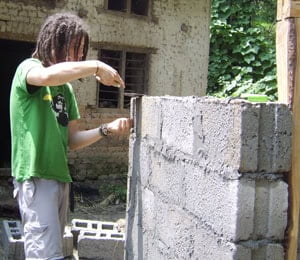
Construction & Mannual Work – Toilet Tour Nepal
The Toilet Tour Nepal not Flushing its Resources. We, in the West, in the developed countries, take our toilets for granted. We take for granted the fact that they are within our houses; an easy dark stumble in the middle of the night. We take for granted the flush; in a second we can summon litres of water to flush away our waste. We take for granted the cleanliness; the hygienic nature of our toilet culture. We take the ‘easiness’ of getting rid of our bodily waste for granted.
In Jitpur, just outside of the Kathmandu valley, I went on a toilet tour. Yes, a toilet tour. Volunteers Initiative Nepal has been constructing toilets in their project community, with the forecasted result being a toilet constructed for every household. There are still many to be built, but already so many have been constructed by VIN volunteers, with the help of the community and household family members.
As we approached a house on our walk up towards Jitpur Tinpiple, a man positively leapt down the path towards our group. “Come and see my toilet, come and see my toilet!” he was imploring in Nepali. His grin was wider than the sides of his face as he showed us with great pride the toilet that he had helped construct. We visited his, and many others on our tour of the community, and talked to some families about the help of VIN, and how their new toilets have improved their daily lives.
The system of having each household contribute both labour and materials to the construction of the toilets results in the upkeep of and accountability for its development and use being appropriately placed on the community members that use it. One family had used their own resources and money to produce a stunning tiled toilet and bathroom area that was the talk of the town. Most however, are simple stone constructions, no bells and whistles, and to the average Westerner – a frightening sight. A trip to a squat toilet with no toilet paper or hand basin, and nothing but a bucket of water to flush can humble even those from a simple, non-luxurious upbringing.
The importance of access to a toilet and the spread of sanitary awareness in Nepal cannot be overstated. Unclean water causes immeasurable health problems, and human waste in the same water ways that are used as sources of drinking water completes a vicious cycle of illness and death. The people of the community that we visited told us that pre-toilet construction they would go to the toilet in their neighbours’ fields. This caused tension between households, and contributed to the unhygienic lifestyle of the community. Now, with toilets attached to their house, the families we visited were ecstatic with their creations that gave them healthy, easy access to a toilet, as well as eased the strain on inter-household relations.
Something that might surprise some Westerners is the growing use of toilets that separate human waste into solids and liquids to produce compost. To grow fruit, vegetables and crops, organic matter is needed in the soil, and families and farmers in Nepal that cannot afford to keep a buffalo or cow are more and more beginning to use human waste as compost. This practice has long been popular in the country by particular castes, and waste can also be used to produce Bio-gas. These practices fit in perfectly with Nepal’s predominantly “Organic by default” state – the land is still largely uncorrupted by chemicals or pesticide use. Many a Westerner might screw up their nose at the thought of eating vegetables grown using human waste as compost – but I personally cannot see why this would disturb someone, when we happily eat food every day that has been grown using cow, sheep or chicken manure.
The practice is literally saving lives – providing small farms and households with the means to grow and sell organic vegetables or feed their family and community, whilst effectively removing waste from nearby schools and other households – thereby stopping the dumping of the waste in a public area or waterway. It is a system that reduces the need for water – which we in the West waste litres of every time we flush. What’s more, human waste compost grown vegetables are rapidly becoming renowned as the best quality vegetables growing in Nepal.
And so the all-important Toilet Revolution is underway in the land of the Himalayas and Lord Buddha, and the work of groups such as Volunteers Initiative Nepal and others spreading sanitation awareness and constructing toilets in marginalised communities is the front line of the battle for the health of the Nepali people. With the evolution of Organic Farming and Permaculture principles bringing to life the obvious and yet stigmatised use of human waste as compost, the future is looking good for a healthier Nepal. It is also a responsibility of us in the West to not take for granted the accessibility we have to clean water and efficient waste disposal systems – and remain open minded and generous in development campaigns in this beautiful country.
By Jacqueline Damen



